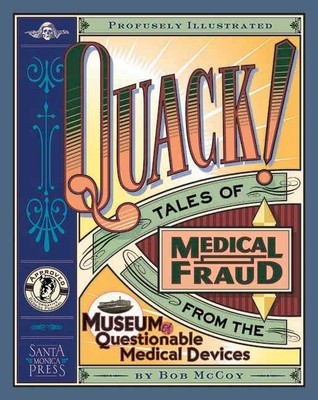
- We will send in 10–14 business days.
- Author: Bob McCoy
- Publisher: Santa Monica Press
- Pages: 238
- ISBN-10: 1891661108
- ISBN-13: 9781891661105
- Format: 21.4 x 27.6 x 1.7 cm, minkšti viršeliai
- Language: English
- SAVE -10% with code: EXTRA
Reviews
Description
In Quack! Tales of Medical Fraud from the Museum of Questionable Medical Devices, curator Bob McCoy shares his collection of the hilarious, horrifying, and preposterous medical devices that have been foisted upon the public in their quest for good health. From the Prostate Gland Warmer to the Recto Rotor, from the Nose Straightener to the Wonder Electric Generator, these implements reveal the desperate measures taken by the public in their search for magic cures. With period advertisements, promotional literature, and gadget instructions, this book offers a wealth of past--and present--medical fraud. For instance, you'll learn about:
Albert Abrams, the King of Quackery, who believed that all that was needed from a patient for diagnosis was a drop of blood, a single hair, or even a handwriting sample as these would give off the unique vibrations of that individual. His theories were so popular that none other than Upton Sinclair promoted them in an article for Pearson's magazine.Wilhelm Reich, the groundbreaking psychiatrist who, in the latter portion of his storied career, discovered Orgone--the energy supposedly released during sexual orgasm. According to Reich, absorbing large quantities of Orgone through his Orgone Energy Accumulator would make a person healthier.
Dr. Albert C. Geyser, whose Tricho machine for removing unwanted hair through x-ray depilitation resulted in thousands of women contracting hardened and wrinkled skin, receded gums, never-healing ulcerated sores, tumors, and, of course, cancer. And if you think quackery is a thing of a past, a sampling of late night television commercials advertising everything from fat burners to magnetic and/or copper pain relievers will cure you of that notion. In fact, in the mid-1990s, a product called The Stimulator was advertised on television as a cure for pain, menstrual problems, arthritis, and carpal tunnel syndrome. The commercial--featuring Evel Knievel as its spokesperson--was so effective that over 800,000 Stimulators were sold for $88.30 before the FDA shut the company down. Still, the owners made quite a hefty profit on what was simply a one dollar gas grill igniter!
EXTRA 10 % discount with code: EXTRA
The promotion ends in 22d.15:30:33
The discount code is valid when purchasing from 10 €. Discounts do not stack.
- Author: Bob McCoy
- Publisher: Santa Monica Press
- Pages: 238
- ISBN-10: 1891661108
- ISBN-13: 9781891661105
- Format: 21.4 x 27.6 x 1.7 cm, minkšti viršeliai
- Language: English English
In Quack! Tales of Medical Fraud from the Museum of Questionable Medical Devices, curator Bob McCoy shares his collection of the hilarious, horrifying, and preposterous medical devices that have been foisted upon the public in their quest for good health. From the Prostate Gland Warmer to the Recto Rotor, from the Nose Straightener to the Wonder Electric Generator, these implements reveal the desperate measures taken by the public in their search for magic cures. With period advertisements, promotional literature, and gadget instructions, this book offers a wealth of past--and present--medical fraud. For instance, you'll learn about:
Albert Abrams, the King of Quackery, who believed that all that was needed from a patient for diagnosis was a drop of blood, a single hair, or even a handwriting sample as these would give off the unique vibrations of that individual. His theories were so popular that none other than Upton Sinclair promoted them in an article for Pearson's magazine.Wilhelm Reich, the groundbreaking psychiatrist who, in the latter portion of his storied career, discovered Orgone--the energy supposedly released during sexual orgasm. According to Reich, absorbing large quantities of Orgone through his Orgone Energy Accumulator would make a person healthier.
Dr. Albert C. Geyser, whose Tricho machine for removing unwanted hair through x-ray depilitation resulted in thousands of women contracting hardened and wrinkled skin, receded gums, never-healing ulcerated sores, tumors, and, of course, cancer. And if you think quackery is a thing of a past, a sampling of late night television commercials advertising everything from fat burners to magnetic and/or copper pain relievers will cure you of that notion. In fact, in the mid-1990s, a product called The Stimulator was advertised on television as a cure for pain, menstrual problems, arthritis, and carpal tunnel syndrome. The commercial--featuring Evel Knievel as its spokesperson--was so effective that over 800,000 Stimulators were sold for $88.30 before the FDA shut the company down. Still, the owners made quite a hefty profit on what was simply a one dollar gas grill igniter!


Reviews